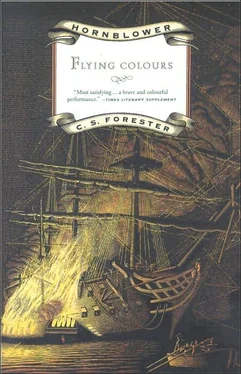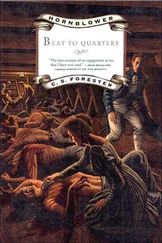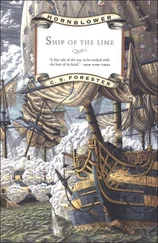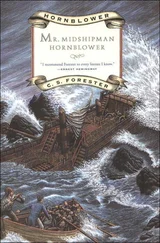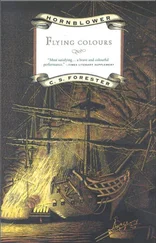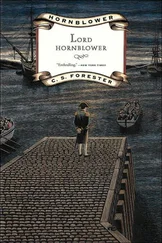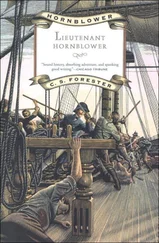Cecil Forester - Flying Colours
Здесь есть возможность читать онлайн «Cecil Forester - Flying Colours» весь текст электронной книги совершенно бесплатно (целиком полную версию без сокращений). В некоторых случаях можно слушать аудио, скачать через торрент в формате fb2 и присутствует краткое содержание. Год выпуска: 1989, ISBN: 1989, Издательство: Back Bay Books, Жанр: Исторические приключения, Путешествия и география, Морские приключения, на английском языке. Описание произведения, (предисловие) а так же отзывы посетителей доступны на портале библиотеки ЛибКат.
- Название:Flying Colours
- Автор:
- Издательство:Back Bay Books
- Жанр:
- Год:1989
- ISBN:0316289396
- Рейтинг книги:5 / 5. Голосов: 1
-
Избранное:Добавить в избранное
- Отзывы:
-
Ваша оценка:
- 100
- 1
- 2
- 3
- 4
- 5
Flying Colours: краткое содержание, описание и аннотация
Предлагаем к чтению аннотацию, описание, краткое содержание или предисловие (зависит от того, что написал сам автор книги «Flying Colours»). Если вы не нашли необходимую информацию о книге — напишите в комментариях, мы постараемся отыскать её.
Flying Colours — читать онлайн бесплатно полную книгу (весь текст) целиком
Ниже представлен текст книги, разбитый по страницам. Система сохранения места последней прочитанной страницы, позволяет с удобством читать онлайн бесплатно книгу «Flying Colours», без необходимости каждый раз заново искать на чём Вы остановились. Поставьте закладку, и сможете в любой момент перейти на страницу, на которой закончили чтение.
Интервал:
Закладка:
It was like a dream indeed—weariness and lack of sleep combined to make it so for Hornblower, who moved about his tasks in a misty unreality which matched the misty darkness of the sea. The galley slaves and prisoners could lie and sleep—there was no fear of trouble from them at present, when they had spent ten hours out of the last twenty pulling at the sweeps with hands which by nightfall were running with blood, but there was no sleep for him nor for Bush and Brown. His voice sounded strange and distant in his own ears, like that of a stranger speaking from another room, as he issued his orders; the very hands with which he held the ropes seemed not to belong to him. It was as if there was a cleavage between the brain with which he was trying to think and the body which condescended to obey him.
Somewhere to the northwest lay the fleet which maintained its unsleeping watch over Brest; he had laid the cutter on a northwesterly course with the wind comfortably on her quarter, and if he could not find the Channel fleet he would round Ushant and sail the cutter to England. He knew all this—it made it more like a dream than ever that he could not believe it although he knew it. The memory of Marie de Graçay’s upper boudoir, or of his battle for life in the flood-water of the Loire, was far more real to him than this solid little ship whose deck he trod and whose mainsheet he was handling. Setting a course for Bush to steer was like playing a make-believe game with a child. He told himself desperately that this was not a new phenomenon, that often enough before he had noticed that although he could dispense with one night’s sleep without missing it greatly, on the second in succession his imagination began to play tricks with him, but it did not help to clear his mind.
He came back to Bush at the tiller, when the faint binnacle light made the lieutenant’s face just visible in the darkness; Hornblower was even prepared to enter into conversation in exchange for a grasp at reality.
“Tired, Mr. Bush?” he asked.
“No, sir. Of course not. But how is it with you, sir?”
Bush had served with his captain through too many fights to have an exaggerated idea of his strength.
“Well enough, thank you.”
“If this breeze holds, sir,” said Bush, realizing that this was one of the rare occasions when he was expected to make small talk with his captain, “we’ll be up to the fleet in the morning.”
“I hope so,” said Hornblower.
“By God, sir,” said Bush, “what will they say of this in England?”
Bush’s expression was rapt. He was dreaming of fame, of promotion, for his captain as much as for himself.
“In England?” said Hornblower vaguely.
He had been too busy to dream any dreams himself, to think about what the British public, sentimental as always, would think of an escaping British captain retaking almost single-handed a captured ship of war and returning in her in triumph. And he had seized the Witch of Endor in the first place merely because the opportunity had presented itself, and because it was the most damaging blow he could deal the enemy; since the seizure he had been at first too busy, and latterly too tired, to appreciate the dramatic quality of his action. His distrust of himself, and his perennial pessimism regarding his career, would not allow him to think of himself as dramatically successful. The unimaginative Bush could appreciate the potentialities better than he could.
“Yes, sir,” said Bush, eagerly—even with tiller and compass and wind claiming so much of his attention he could be loquacious at this point—“It’ll look fine in the Gazette, this recapture of the Witch. Even the Morning Chronicle, sir—”
The Morning Chronicle was a thorn in the side of the government, ever ready to decry a victory or make capital of a defeat. Hornblower remembered how during the bitter early days of his captivity at Rosas he had worried about what the Morning Chronicle would say regarding his surrender of the Sutherland.
He felt sick now, suddenly. His mind was active enough now. Most of its vagueness must have been due, he told himself, because he had been refusing in cowardly fashion to contemplate the future. Until this night everything had been uncertain—he might have been recaptured at any moment, but now, as sure as anything could be at sea, he would see England again. He would have to stand his trial for the loss of the Sutherland, and face a court martial, after eighteen years of service. The court might find him guilty of not having done his utmost in the presence of the enemy, and for that there was only one penalty, death—that Article of War did not end, as others did, with the mitigating words ‘or such less penalty—’. Byng had been shot fifty years before under that Article of War.
Absolved on that account, the wisdom of his actions in command of the Sutherland might still be called into question. He might be found guilty of errors of judgement in hazarding his ship in a battle against quadruple odds, and be punished by anything from dismissal from the service, which would make him an outcast and a beggar, down to a simple reprimand which would merely wreck his career. A court martial was always a hazardous ordeal from which few emerged unscathed—Cochrane, Sydney Smith, half a dozen brilliant captains had suffered damage at the hands of a court martial, and the friendless Captain Hornblower might be the next.
And a court martial was only one of the ordeals that awaited him. The child must be three months old now; until this moment he had never been able to think clearly about the child—boy or girl, healthy or feeble. He was torn with anxiety for Maria—and yet, gulping at the pill of reality, he forced himself to admit that he did not want to go back to Maria. He did not want to. It had been in mad jealousy of the moment, when he heard of Lady Barbara’s marriage to Admiral Leighton, that the child had been conceived. Maria in England, Marie in France—his conscience was in a turmoil about both of them, and underlying the turmoil was an unregenerate hunger for Lady Barbara which had remained quiescent during his preoccupation but which he knew would grow into an unrelenting ache, an internal cancer, the moment his other troubles ceased, if ever they did.
Bush was still babbling away happily beside him at the tiller. Hornblower heard the words, and attached no meaning to them.
“Ha-h’m,” he said. “Quite so.”
He could find no satisfaction in the simple pleasures Bush had been in ecstasy about—the breath of the sea, the feeling of a ship’s deck underfoot—not now, not with all these bitter thoughts thronging his mind. The harshness of his tone checked Bush in the full career of his artless and unwonted chatter, and the lieutenant pulled himself up abruptly. Hornblower thought it was absurd that Bush should still cherish any affection for him after the cutting cruelty with which he sometimes used him. Bush was like a dog, thought Hornblower bitterly—too cynical for the moment to credit Bush with any perspicacity at all—like a dog, coming fawning to the hand that beat him. Hornblower despised himself as he walked forward again to the mainsheet, to a long, long, period of a solitary black hell of his own.
There was just the faintest beginning of daylight, the barest pearly softening of the sombreness of night, a greyness instead of a blackness in the haze, when Brown came aft to Hornblower.
“Beggin’ your pardon, sir, but I fancy I see the loom of something out there just now. On the port bow, sir—there, d’you see it, sir?”
Hornblower strained his eyes through the darkness. Perhaps there was a more solid nucleus to the black mist out there, a tiny something. It came and went as his eyes grew tired.
Читать дальшеИнтервал:
Закладка:
Похожие книги на «Flying Colours»
Представляем Вашему вниманию похожие книги на «Flying Colours» списком для выбора. Мы отобрали схожую по названию и смыслу литературу в надежде предоставить читателям больше вариантов отыскать новые, интересные, ещё непрочитанные произведения.
Обсуждение, отзывы о книге «Flying Colours» и просто собственные мнения читателей. Оставьте ваши комментарии, напишите, что Вы думаете о произведении, его смысле или главных героях. Укажите что конкретно понравилось, а что нет, и почему Вы так считаете.
